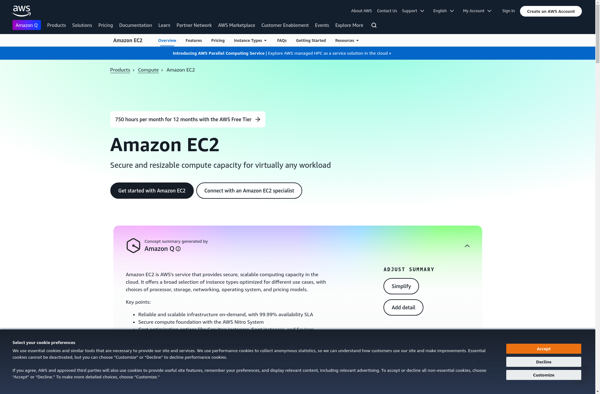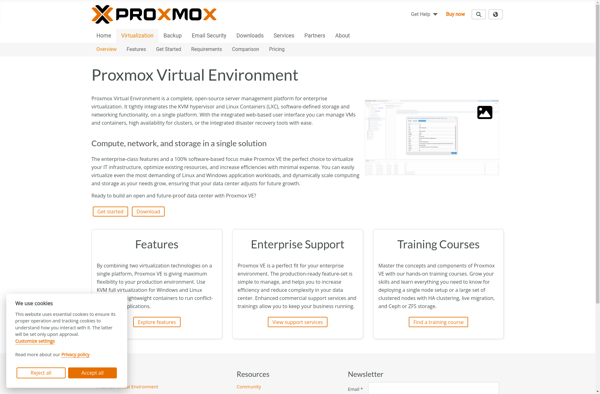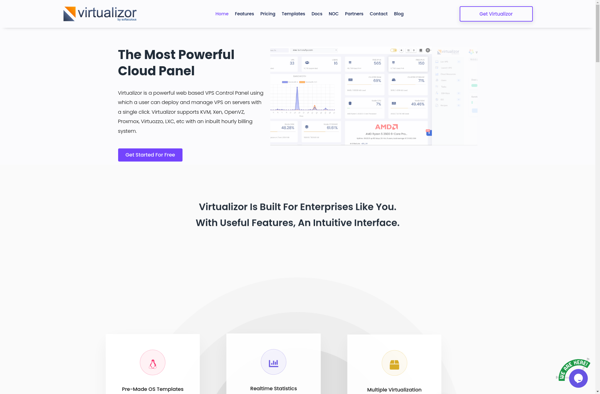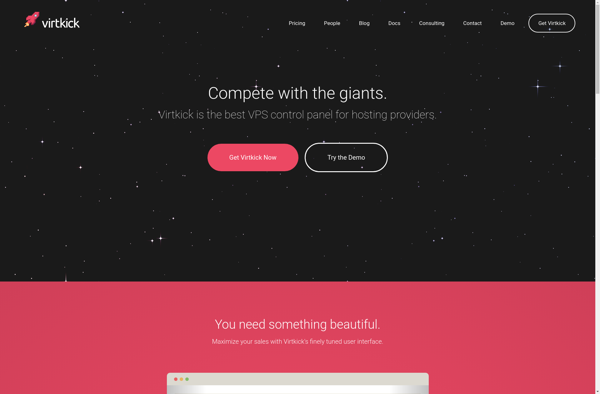Vmango
vmango is an open-source virtual machine and container management platform. It allows you to manage virtual machines, containers, storage, and networks from a single interface.

vmango: Open-Source Virtual Machine and Container Management Platform
Discover the power of vmango, an open-source virtual machine and container management platform that streamlines VM, container, storage, and network management from a single interface.
What is Vmango?
vmango is an open-source platform for managing virtual infrastructure and container workloads. It provides a unified interface to manage virtual machines, containers, storage, and networking in one place.
Some key features of vmango include:
- Virtual machine management - Create, run, migrate, and manage VMs from various hypervisors like ESXi, Hyper-V, and KVM
- Container management - Deploy, scale, and manage Docker and Kubernetes containers and clusters
- Storage management - Allocate, monitor, and manage storage for VMs and containers from one interface
- Network management - Define software and virtual networks for secure communication between VMs and containers
- Multi-cloud support - Manage workloads across private and public clouds like AWS, Azure, and Google Cloud
- Automation and orchestration - Automate provisioning, scaling, and management of resources with vmango's orchestration engine
- REST API - Manage vmango programmatically via API for custom integrations and automation
- Role-based access control - Fine-grained access controls for users and teams
With its single-pane-of-glass approach, vmango simplifies day-to-day virtualization and container operations for IT teams and DevOps engineers. Its open source model also allows customizations as per specific organizational needs.
Vmango Features
Features
- Open source virtual machine and container management
- Single interface to manage VMs, containers, storage and networks
- VM live migration
- Container orchestration
- Resource quotas
- Access controls
- APIs for automation
Pricing
- Open Source
- Free
Pros
Free and open source
Simple and easy to use
Active community support
Integrated platform for VMs and containers
Scalable architecture
Cons
Limited enterprise features compared to paid options
Steeper learning curve than turnkey solutions
Lacks official support services
Not ideal for large deployments
GUI is basic and lacks polish
Official Links
Reviews & Ratings
Login to ReviewThe Best Vmango Alternatives
Top Os & Utilities and Virtualization and other similar apps like Vmango
Here are some alternatives to Vmango:
Suggest an alternative ❐Microsoft Azure
Microsoft Azure, commonly referred to as Azure, is a robust and extensive cloud computing platform developed by Microsoft. Launched in 2010, Azure has evolved into one of the leading cloud service providers, offering a wide range of solutions for businesses, developers, and IT professionals. Azure provides a scalable and flexible...

Linode
Linode is a cloud infrastructure provider that has been providing virtual servers, commonly referred to as Linode instances, since its founding in 2003. Linode aims to empower developers and businesses by offering a straightforward and reliable cloud platform for hosting a wide range of applications and services. Key Features: Virtual...

DigitalOcean
DigitalOcean is a cloud infrastructure provider that has gained popularity for its straightforward and developer-centric approach to cloud computing. Established in 2011, DigitalOcean aims to simplify the deployment and management of applications by offering a user-friendly platform with a focus on performance, scalability, and ease of use. Key Features: Droplets...

OpenStack
OpenStack is an open-source cloud operating system that controls large pools of compute, storage, and networking resources. It is managed through a dashboard or via the OpenStack API. OpenStack works with popular enterprise and open source technologies, making it ideal for heterogeneous infrastructure.OpenStack provides an Infrastructure-as-a-Service (IaaS) solution through a...

Amazon Elastic Compute Cloud
Amazon Elastic Compute Cloud (Amazon EC2) provides scalable computing capacity in the Amazon Web Services (AWS) cloud. Using Amazon EC2 eliminates your need to invest in hardware up front, so you can develop and deploy applications faster.You can use Amazon EC2 to launch as many or as few virtual servers...

Amazon Lightsail
Amazon Lightsail is a virtual private server (VPS) hosting service offered by Amazon Web Services (AWS). It provides developers an easy way to launch and manage virtual servers with configurable compute, storage, and networking capacity to deploy websites and web applications.Some key features of Amazon Lightsail include:Simple setup with preconfigured...

Proxmox Virtual Environment
Proxmox Virtual Environment (Proxmox VE) is an open-source server virtualization management solution based on QEMU/KVM virtualization and LXC containers. It allows you to manage virtual machines and containers using a web-based GUI. Key features include:Hypervisor built on Linux Kernel-based Virtual Machine (KVM) technology for virtualizationLinux Containers (LXC) for container-based virtualizationWeb-based...

Virtualizor
Virtualizor is an open-source web-based virtualization management system designed specifically for web hosting providers and data centers to manage virtual private servers (VPS) and cloud servers. It works by creating an abstraction layer on top of virtualization platforms such as KVM, Xen, Virtuozzo and OpenVZ to provide a feature-rich web...

MicroCloud
MicroCloud is an open-source private cloud computing platform built using proven open-source technologies. It aims to provide users with an easy way to deploy virtual machines and containers in their own private cloud infrastructure, without the cost and privacy concerns of public cloud providers.At its core, MicroCloud uses libvirt and...

Virtkick
Virtkick is a virtual machine management and automation platform used by developers, IT teams, and managed service providers to easily deploy and manage virtual infrastructure. It works across public clouds like AWS, Azure, and Google Cloud as well as private clouds and on-premises environments running VMware, Hyper-V, KVM, and more.Key...

CloudStack
CloudStack is an open source cloud computing software platform that is used to create, manage, and deploy infrastructure cloud services. It allows organizations to build full-featured public or private clouds, capable of elastic scaling to handle changing workloads.Some key capabilities and features of CloudStack include:Supports multiple hypervisors like KVM, VMware,...
